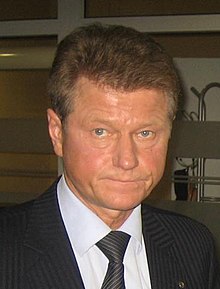
Back رولانداس باكساس Arabic رولانداس باكساس ARZ Rolandas Paksas AST Ruolonds Paksos BAT-SMG Раландас Паксас Byelorussian Раляндас Паксас BE-X-OLD Rolandas Paksas Catalan Rolandas Paksas Czech Rolandas Paksas Danish Rolandas Paksas German
This article's factual accuracy may be compromised due to out-of-date information. (December 2023) |
Rolandas Paksas | |
|---|---|
 Paksas in 2009 | |
| 6th President of Lithuania | |
| In office 26 February 2003 – 6 April 2004 | |
| Prime Minister | Algirdas Brazauskas |
| Preceded by | Valdas Adamkus |
| Succeeded by | Artūras Paulauskas (Acting) |
| Member of European Parliament | |
| In office 4 June 2009 – 1 July 2019 | |
| 9th and 11th Prime Minister of Lithuania | |
| In office 26 October 2000 – 20 June 2001 | |
| President | Valdas Adamkus |
| Preceded by | Andrius Kubilius |
| Succeeded by | Eugenijus Gentvilas (Acting) |
| In office 18 May 1999 – 27 October 1999 | |
| President | Valdas Adamkus |
| Preceded by | Irena Degutienė (Acting) |
| Succeeded by | Irena Degutienė (Acting) |
| Leader of the Opposition | |
| In office 12 July 2001 – 1 November 2001 | |
| Succeeded by | Gintaras Steponavičius (interim) |
| Member of the Seimas | |
| In office 19 October 2000 – 15 February 2003 | |
| Preceded by | Aloyzas Sakalas |
| Succeeded by | Andrius Kubilius |
| Constituency | Antakalnis |
| Personal details | |
| Born | 10 June 1956 Telšiai, Lithuanian SSR, Soviet Union (now Lithuania) |
| Political party | Communist Party of Lithuania (1983~1989) Democratic Labour Party (1989–1995) Homeland Union (1995–1999) Liberal Union (1999–2002) Order and Justice (2002~2003, 2004–2018) Independent (2003~2004, 2018–present) |
| Spouse | Laima Paksienė |
| Alma mater | Vilnius Gediminas Technical University Leningrad Civil Aviation Academy |
| Profession | Pilot, Politician, Businessman, Engineer. |
| Military service | |
| Allegiance | |
| Branch/service | |
| Rank | |
Rolandas Paksas ([rɔˈɫɐ̂ˑndɐs ˈpaːksɐs] ; born 10 June 1956) is a Lithuanian politician who served as the sixth president of Lithuania from 2003 until his impeachment in April 2004. He previously served two terms as the prime minister of Lithuania in 1999, and again from 2000 to 2001, and as Mayor of Vilnius from 1997 to 1999 and again from 2000 to 2001. He led Order and Justice from 2004 to 2016 and was a Member of the European Parliament from 2009 to 2019.
A national aerobatics champion in the 1980s, after the collapse of the Soviet Union, Paksas founded a construction company, Restako. In 1997, he was elected to the Vilnius City Council for the centre-right Homeland Union and became mayor. In May 1999, Paksas was appointed Prime Minister, but resigned five months later after a disagreement over privatisation. Paksas joined the Liberal Union of Lithuania (LLS) in 2000. The LLS won the 2000 election, and Paksas became prime minister again, but he left within seven months after another dispute over economic reforms.
In 2002, Paksas founded the Liberal Democratic Party, and ran for the presidency, winning the run-off against incumbent Valdas Adamkus in January 2003. It emerged that he had granted citizenship to a major campaign donor, leading to his impeachment and removal from office in April 2004. He was the first European head of state to have been impeached.[2] Barred from the Seimas, Paksas was elected to the European Parliament in 2009, while leading his party, now called Order and Justice (TT). His lifetime ban from the Seimas was ruled to be disproportionate measure by the European Court of Human Rights in 2011. In 2018 the amendment which would allow Paksas to run for the Seimas was submitted.[3] But he will not be allowed to run for president or become the speaker of the Seimas. He is considered to be the worst President of Lithuania in modern history.[4]
- ^ "KASP brošiūra" (PDF).
- ^ "Lithuanian Parliament Removes Country's President After Casting Votes on Three Charges". New York Times. 7 April 2004. Retrieved 28 January 2010.
- ^ "Amendment to allow Paksas to run for Lithuanian parliament, president to be submitted". Lithuania Tribune. 27 March 2018. Retrieved 25 March 2019 – via Delfi.
- ^ "Politologai baisisi R.Pakso kadencijos rezultatais - Lietuvoje - m.DELFI.lt".
© MMXXIII Rich X Search. We shall prevail. All rights reserved. Rich X Search